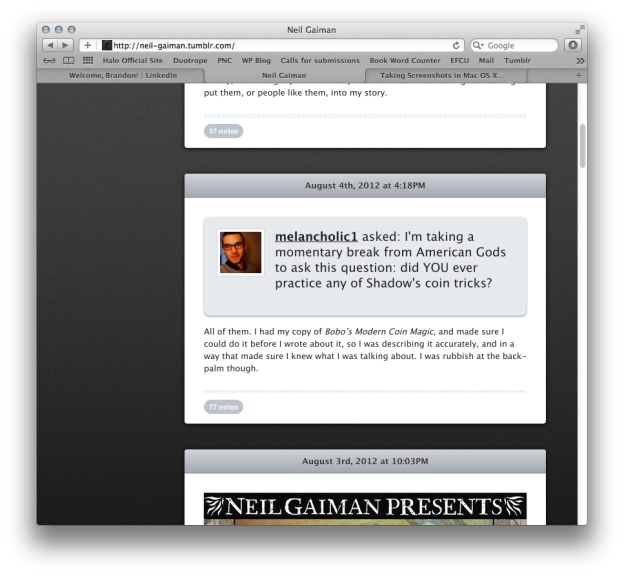It’s about time I get back to this blog. Only three years later!
So, I don’t write nearly as much as I used to. During my last semester at Edinboro, I remember my two favorite and most-respected professors cautioning me that the writing life changes a bit, post-graduation. When asked to elaborate, one shook his head, smiling, and insisted it gets harder, and can even cease to exist for a few months. The other professor recounted his career change which took him away from writing for roughly four years until he decided to pursue a PhD in some sort of literature. I remember thinking this wouldn’t happen to me. I mean, writing was my life, right? It was really all I did and was passionate about, save for a couple hobbies. It could never happen to me.
It did escape me. Off-and-on for about 2.5 years. I would have the occasional writing burst, where I would pump out an essay or jot down some wild addition for a fictional universe, but this was all a far cry from the sort of volume I produced back at university.
I’m not sure if I’ll ever get back to that point. I’m not sure I want to. Sure I wrote more, but the content of which was lacking substance and laced with overblown prose; upon reading some old stuff, I am practically nauseated. This is what I thought good writing was? And I can’t stand that kind of writing anymore. Something changed my ideas of good writing. Maybe it was an appreciation for brevity? Maybe I found narrative-driven writing more appealing? Or maybe the couple years away allowed me to be objective enough to see where my writing became thin and insubstantial?
It’s terrible, really: leaving behind what you worked four years on, only to come back have grown out of your own work. There is one constant, though. And it’s that although I might not write much or didn’t write at all, I still have this impression of myself as a writer. I know I am a writer. Because writing, to me, is no longer just about putting one word in front of the next. It’s also about dreaming, using your imagination to explore ideas you’re interested in and then becoming passionate about that process. And if not that, writing is about being a critical being–being observant, resistant to accepting the superficial, having the will to dig deeper and to learn more, about people and their thoughts. Asking questions, asking the right questions. Accepting nothing less than substance and resting only when you’ve learned. And most importantly, for me, at this point in my writing career/artistic life, writing is about developing the courage to share your creations with those around you, even if you aren’t completely confident in them.
Which brings me to this.
I want to try writing a graphic novel memoir. I’ve had the best luck with my non fiction writing, so it makes sense. I’m not very good at drawing, but I love doing it and want badly to become better. And after reading David Small’s Stitches I’ve been inspired try. The book’s artwork is many things, but simple is what I’m getting at. It doesn’t take itself too seriously: not every line is accounted for; not shading something perfectly won’t make the scene silly; exaggeration and caricature is encouraged. And it’s wildly famous and well-received. If he did it, maybe I can.
So, here’s to trying new things, taking on the courage to display those things publicly, and being artistic again after so long.



